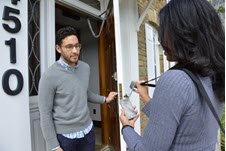Implementing Bring Your Own Device (BYOD) in a Survey Organization
Implementing Bring Your Own Device (BYOD) in a Survey Organization
When interviewers administer a survey in a Computer Assisted Personal Interview (CAPI) mode, survey organizations like the U.S. Census Bureau incur great costs acquiring and maintaining devices such as laptops, tablets or cell phones for interviewers to use in the field. One potential way to mitigate these costs is to ask interviewers to use their own personal devices. This is also known as the Bring Your Own Device (BYOD) initiative.

The Census Bureau is no longer considering BYOD for the 2020 Census due to potential logistical and administrative challenges (see Memorandum 2016.01: Decision on Using Device as a Service in the 2020 Census Program). However, BYOD may still be considered for other Census Bureau surveys in the future, and by other survey organizations. Technical feasibility and cost savings are two major considerations. In this blog, we highlight a few findings from the Center for Survey Measurement on the feasibility of a BYOD program from two other perspectives:
- How do current and potential interviewers perceive BYOD? Are people willing to use their own devices for work tasks, including survey fieldwork?
- How does the public feel about interviewers using their own devices to collect personal information?
We conducted both qualitative and quantitative research on BYOD. Our qualitative research included focus groups with the public and with Census Bureau interviewers following two major tests leading up to the 2020 Census (the 2014 and 2015 Census Tests). Our quantitative research included surveys of Census Bureau interviewers as well as survey questions asked of the public on a nationally representative Random Digit Dial (RDD) telephone survey conducted by the Gallup organization.
1. How do current and potential interviewers perceive BYOD? Are people willing to use their own devices for work tasks, including survey fieldwork?
We asked the general public about using their own smartphones for work to understand whether potential interviewers would be willing to participate in a BYOD initiative. Generally, we found evidence in our nationally representative Gallup telephone survey that the majority of smartphone and tablet owners would be willing to use their personal device for work-related purposes, with, for example, 72% of owners being willing to use their device for work-related email. These statistics represent data collected from January through April of 2015.
Many of the Census Bureau interviewers we spoke to in our focus groups were open to using their own devices for work as well. However, interviewers were unsure how BYOD would work from a logistical perspective. For example, one concern interviewers had was whether the Census Bureau would have access to private content on their devices. Reimbursement for personal data use was also a common concern. Interviewers who had unlimited data plans for their devices were less concerned about how they would be reimbursed, however.
2. How does the public feel about interviewers using their own devices to collect personal information?
While interviewers’ willingness to participate in BYOD seems promising, public perception of data collection on personal devices is also an important concern. Analyzing responses from Gallup survey questions administered to the public in January through April 2015, we found that less than a quarter of respondents favored interviewers using their personally owned devices to collect Census Bureau data when it was presented as a cost-saving measure (23.6 percent).
However, nearly one-fifth of respondents (18.5 percent) neither favored nor opposed BYOD enumeration. Those who were opposed to BYOD were asked an open-ended, follow-up question to learn more about their concerns. Respondents most commonly reported privacy concerns, as well as concerns about security, data getting into the wrong hands, interviewer misuse of data and fairness to interviewers.
Responses from members of the public to whom we spoke during a series of focus groups echoed many of these concerns. They were unsure about how BYOD would work and tended to assume that their information would not be secure when using a personal device. However, it is not clear that survey respondents will be able to tell whether an interviewer is using a personal device unless the respondent is explicitly told. Focus group respondents struggled to name ways in which they might be able to tell that a device is not a government-issued device.
We also believe that some of these concerns regarding privacy and security may not be as great for surveys that do not ask respondents about their addresses and household composition. Thus, while BYOD is not currently under consideration for the 2020 Census, we hope that our research will help guide other surveys and survey organizations considering it. Surveys that implement BYOD will need to outline clear strategies for reimbursing interviewers and alleviating respondent concerns.



